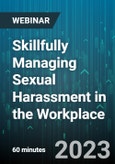While the #MeToo movement inspired many men and women to come forward with their stories, sexual harassment is still a very real problem in many organizations.
Unfortunately, in the corporate workplace, 75% of workplace sexual harassment goes unidentified and 39% of employees don’t believe their concerns will be addressed. Many of the people doing the harassment are in positions of power, therefore making taking action harder. This leaves the people who have been harassed feeling anxious, isolated, diminished, and not sure about the best next steps to take. Targets may experience both physical (headaches, stomachaches, insomnia, etc) as well as fear, self-blame, self-doubt, depression, and withdrawal.
However, there are powerful steps employees and leaders can take to moderate and diminish unwanted behavior.
Why you should Attend
The US Equal Opportunity and Employment Commission defines sexual harassment in the terms below:
- It is unlawful to harass a person (an applicant or employee) because of that person's sex. Harassment can include 'sexual harassment' or unwelcome sexual advances, requests for sexual favors, and other verbal or physical harassment of a sexual nature
- Harassment does not have to be of a sexual nature, however, and can include offensive remarks about a person's sex. For example, it is illegal to harass a woman by making offensive comments about women in general
- Both target and the harasser can be either a woman or a man, and the victim and harasser can be the same sex. Retaliation for reporting unwanted behavior is also against the law
- The harasser can be the victim's supervisor, a supervisor in another area, a co-worker, or someone who is not an employee of the employer, such as a client or customer
Even with these guidelines, sexual harassment may be difficult to discuss, document, and report.
Areas Covered in the Session
- What constitutes sexual harassment and sexual misconduct
- How to move from “victim” to “target” and get support
- Understanding and Setting Your Own Boundaries
- Best Practice Models for Indicating the Behavior is Unwelcome
- How to help targets who are experiencing sexual harassment
- Review the US government laws (EEOC) that protect targets
- How to best address concerns in your organization given their policies
- Resources for support: Legal, emotional, HR management, advocacy
Speakers
Suzanne Blake, PCC, is an award-winning International Coach Federation Professional Certified Coach with 23 years of coaching, training, and business consulting experience. With warmth, humor, and the latest in coaching and brain science techniques, Suzanne helps individuals and groups attain their communication, empowerment, career, and leadership goals.
Who Should Attend
- Sales
- Customer Service
- Managers
- Leaders
- Office Workers
- Field Representatives
- HR
- Meeting Planners
- Hospitality Employees and Managers








